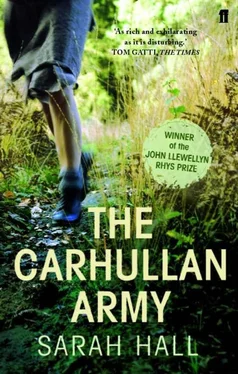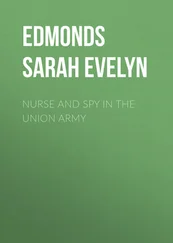Sarah Hall - The Carhullan Army
Здесь есть возможность читать онлайн «Sarah Hall - The Carhullan Army» весь текст электронной книги совершенно бесплатно (целиком полную версию без сокращений). В некоторых случаях можно слушать аудио, скачать через торрент в формате fb2 и присутствует краткое содержание. Год выпуска: 2008, Издательство: Faber and Faber, Жанр: Современная проза, на английском языке. Описание произведения, (предисловие) а так же отзывы посетителей доступны на портале библиотеки ЛибКат.
- Название:The Carhullan Army
- Автор:
- Издательство:Faber and Faber
- Жанр:
- Год:2008
- ISBN:нет данных
- Рейтинг книги:4 / 5. Голосов: 1
-
Избранное:Добавить в избранное
- Отзывы:
-
Ваша оценка:
- 80
- 1
- 2
- 3
- 4
- 5
The Carhullan Army: краткое содержание, описание и аннотация
Предлагаем к чтению аннотацию, описание, краткое содержание или предисловие (зависит от того, что написал сам автор книги «The Carhullan Army»). Если вы не нашли необходимую информацию о книге — напишите в комментариях, мы постараемся отыскать её.
The Carhullan Army — читать онлайн бесплатно полную книгу (весь текст) целиком
Ниже представлен текст книги, разбитый по страницам. Система сохранения места последней прочитанной страницы, позволяет с удобством читать онлайн бесплатно книгу «The Carhullan Army», без необходимости каждый раз заново искать на чём Вы остановились. Поставьте закладку, и сможете в любой момент перейти на страницу, на которой закончили чтение.
Интервал:
Закладка:
We entered the soft air of the greenhouse. The panes had crosses taped over them to keep the cracked glass in place. On the building’s roof were three solar panels, and the interior was warmed by a circulating hot-water system. It had cost a fortune back when she bought it all, Jackie said. But it had been worth it. The women ate tomatoes from May to September. There were soft fruits that came out of season, soya beans and citrus. ‘The Victorians called places like this forcing houses,’ she said. ‘It’s not hard to learn from the past and apply it to the present, Sister. That’s all we’ve done.’ In the corner of the structure, a woman was bending down behind a rack of seedlings. She righted herself and smiled at us. Her pale haunting eyes were familiar. ‘This is Benna. My green-fingered cousin. What would I do without her?’ ‘You’d get rickets,’ the woman replied, and Jackie smiled.
In the stone outbuildings hung racks of smoked char and trout, sides of beef, mutton, venison, and pork. There were straw drays of eggs. They tried not to waste too many bullets on the local deer, Jackie told me. Usually that meant her or Megan or one or two others went after them in the winter, when they were easier to pick off. Whichever sharpshooter got the kill also got the tongue, prepared in vinegar and thyme by Ruthie. ‘It puts a spring in your step,’ Jackie said, rocking up onto her toes. ‘Come on, I’ll show you.’
We crossed the courtyard into another small stone building. It was the slaughter room. Lorry was already inside, steeling a blade and preparing to skin a deer. It hung from its bound back legs on an iron hook, limp through its full length, a young hind. I put my hand on the fleece of its belly. The body was vaguely warm. There was the coppery smell of blood lingering in the enclosure and the fust of animal hide. It was all done too quickly to turn my stomach, a few fast shaves of the bowing knife, a hissing cleft, the pale blue and burgundy sacks of organs removed from the cavity of its belly and dumped into a bucket. Only the undigested grassy cud bothered me, its green fronds twisted together and steaming on the cool stone floor.
Lorry took out the tongue and gave it to Jackie, who placed it on the scored game table, took up a smaller knife and slit it neatly in half. She pinched the scrap and put it into her mouth. Lorry shook her head. ‘I take it you got this one, then,’ I said. Jackie swallowed. ‘I did,’ she replied. ‘But it was your Number Five that dropped it. I thought the mechanism might have fused, but it’s cleaned up all right. Good scour and a bit of oil. So. Go on. Fair’s fair.’ Her mouth lifted at its good side but she held her poise. The invitation was serious. I looked down at the puckered strip of meat on the marble slab. I knew if I thought about it too long I’d never manage it. Whatever minor challenge was being issued, I did not want to fail.
The tongue was softer than I thought it would be and tasted of soil. I did not chew but forced it down whole. My throat made a clucking sound and I brought my fist to my lips. The two women laughed loudly and Jackie took hold of my elbows and shook me. ‘Hell’s tits! Revolting, isn’t it?’ She reached into a side pocket of her fatigues and took out a hip flask. ‘Here. Quick. Better give it some alcohol before it starts tasting your breakfast.’ Lorry laughed harder and leaned on the red-smeared marble for support. I felt my stomach pitch and I shook my head and walked into the fresh air of the courtyard.
It was not just game that was hunted at Carhullan. Crayfish and snails were collected from under the beck rocks and the garden’s leaves. A local delicacy, I was told. They were fried with butter and garlic on the big griddle of the range. The vegetable plots were extensive. They were tended every day by a group of women who were more worried about insect netting than anything else they ever had been in their lives, Jackie said. And they were happier for it.
What was not taken and used fresh was pickled or dried, preserved for the harsher months when less was growing. Nothing edible in the vicinity went unharvested. Nothing was wasted. There were full casks of autumn nuts, apples, and mushrooms. The glass jars on the larder shelves looked old and domestic — saved from the time before the mass importation began. There was a small dairy where the milk was strained, separated, and churned, made into cheese and butter. Nearby, in the meadows, were the beehives. The honey was speckled with black. It tasted floral with a slightly tropical note from the gorse blossom and the heather. Lorry used it as a mild antiseptic, I discovered, and when it was available the royal jelly was divvied up among everyone. Meals were small and basic, but mostly they managed, Jackie told me.
The driest of the sheds contained salt and sugar, oils and seeds, provisions brought up in great quantities before the place became autonomous and sustainable, though some of the containers looked new and when I saw them I began to suspect that Jackie’s visits to the town were perhaps raids, and that she lifted items out from under the Authority’s nose from time to time. In the terrace quarters we had been told that our rations were low because of stealing that had gone on while the food was en route, but no more details were ever given out. When I told Jackie this she said the first rule of population control was that enemies of the state had to be played down, never described as a serious threat. Otherwise people might get ideas. Though the Authority seemed forceful and despotic, with the bulk of the army gone the country was weak. It would only take a small uprising to punch holes in the fabric of government, she said.
The crates of fruit were laid out carefully, with none of the pieces touching, so that blight and mould could not spread. Anything rotten would be given to the animals, or composted. It was a serious and honest existence at the farm. There was no external support system. Carhullan had burned its bridges the day the women failed to show up for the Civil Reorganisation. They were on the blacklist, illegals. But the more pressing concern was how to survive.
One hundred years ago, Jackie said, I could have walked up the fells and found the same sort of industry as this, with the same severe penalties for mismanagement. There was a purity to the existence, a basic sense of solvency, that the country had long since discredited. And I could already see the satisfactions of such a way of life. After so many months of tin openers and foil packaging, reconstituted food and dependence on the foreign shipments, this was as honest and raw as I could get.
‘It’s incredible,’ I said to her as she lifted the latch on the door of the largest byre. ‘You own all this.’ She paused before going inside. ‘No. We’ve never owned anything, Sister. The lands of Britain belonged to the Crown, ever since the Norman Conquest. The government has always had the power to nationalise land, and declare it state-owned. It never did until now. Crisis management. That’s how they’ve been able to move people into those rat holes they call quarters. The flood zones just got the ball rolling, made it all seem reasonable. A wet run for the real thing.’ I stared at her, amazed. She shrugged. ‘No one knew about any of that. And ignorance leaves people vulnerable, doesn’t it?’
She pulled open the wooden door of the barn and it grated on the ground. A slanting light fell in through the narrow windows. Inside, under tarpaulin covers, were the Land Rover and the army wagon. The huge deep-treaded tyres of the Bedford stuck out from under its sheeting. Next to these was a substantial supply of diesel in heavy plastic containers and metal drums. I was right to have assumed Jackie Nixon had predicted the economic spiral. She had removed from civilisation those things that she needed to assist her enterprise, her brave new world, and then she had become self-reliant.
Читать дальшеИнтервал:
Закладка:
Похожие книги на «The Carhullan Army»
Представляем Вашему вниманию похожие книги на «The Carhullan Army» списком для выбора. Мы отобрали схожую по названию и смыслу литературу в надежде предоставить читателям больше вариантов отыскать новые, интересные, ещё непрочитанные произведения.
Обсуждение, отзывы о книге «The Carhullan Army» и просто собственные мнения читателей. Оставьте ваши комментарии, напишите, что Вы думаете о произведении, его смысле или главных героях. Укажите что конкретно понравилось, а что нет, и почему Вы так считаете.












